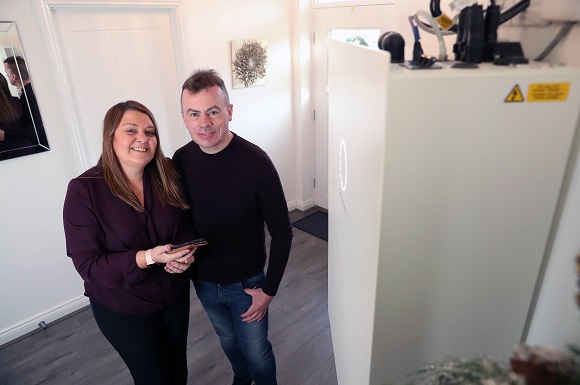A pilot project aiming to demonstrate the viability of a demand-side approach to energy management at domestic level has demonstrated a substantial reduction in both consumer bills and carbon emissions.
 The government funded FLATLINE* research project sought to demonstrate how, using batteries in conjunction with smart energy management systems, demand from homes could be ‘time-shifted’ to better align with energy generation.
The government funded FLATLINE* research project sought to demonstrate how, using batteries in conjunction with smart energy management systems, demand from homes could be ‘time-shifted’ to better align with energy generation.
The trial’s 20 newbuild homes in Wales were installed with solar panels, battery storage, hot water tanks and ground source heat pumps, along with the resident facing interface developed by Sero and the background energy management systems developed by Passiv UK.
Residents entered their lifestyle and behavioural preferences into a bespoke ‘Sero Life’ app, enabling the energy system’s software to forecast and demand-shift, using factors like weather and behaviours to inform its algorithms.
The systems then intelligently drew, discharged and anticipated energy demands, almost completely avoiding the National Grid at peak times, keeping carbon intensity to a minimum. The system also reduced energy expenses through a combination of buying energy at cheaper times and opening up the benefits of grid balancing payments.
Supported by the Department for Business, Energy & Industrial Strategy (BEIS) £505m Energy Innovation Programme, the pilot was tested in 20 homes at The Mill in Cardiff and Parc Eirin in Tonyrefail.
Trial key findings:
- Successful delivery of the ‘no-net-import’ elements – where the home shifts to its stored / generated energy rather than drawing from the grid.
- Successful delivery of the ‘negative import’ interventions, where the home actively exports energy back to the grid.
- Successful avoidance of peak demand periods, through battery charging during low demand, cheaper rate energy and low carbon intensity periods – and utilising excess solar generation.
- The battery itself – the key enabling asset – led to running cost savings of around £220 per year, roughly a 25% reduction.
- The average carbon emissions saving at Parc Eirin are forecast at 71.2 tCO₂/year (the equivalent of the emissions produced by 15 cars in a year[2]). This could be increased by a further 4-6% due to DSR (equating to an average of 46-66kg per home annually).
In the coming weeks, a number of dissemination webinars will take place to share the findings with industry. As well as sharing information on the FLATLINE trial, the sessions will explore how domestic demand side response can play a key role in helping decarbonise the Grid and reach government net zero targets.
Andy Sutton, Co-Founder & Design and Innovation Director at Sero Homes, said:
“Our trial shows that using smarter networks and bespoke solutions in the energy system can deliver real savings within domestic settings, as well as contribute to the decarbonisation agenda and support the Grid.
“We know that DSR is expected to play a key role within future electricity systems, so our pilot has major implications when it comes to the potential for scaling up and rolling out more innovative and clean energy processes.
“We’re proud to be leading the way in showing in a real-life context how we can better complement the electricity network and it would be hugely positive to see this type of technology integrated as standard into new housing developments.
“Ultimately, the FLATLINE concept proposes a win win scenario: flexible and intelligently-managed energy use – resulting in significantly lower bills to home occupants – practically eliminating the risk of fuel poverty and reducing electrical demands on the National Grid by shifting them entirely off peak.”
Paul Clark, Vice President of Policy and Marketing at Passiv UK, said:
“This is an exciting time for those of us challenging the way we heat our homes through using smart technology to support with the UKs transition to net zero emissions. We have been delighted to partner with Sero on this project and to showcase the difference our controls and use of low carbon technologies can make. This project really shows what is possible. It should be a blueprint for all developers as they begin to plan for the introduction of the Future Homes Standard, as well as DSOs, as they bring forward new local flexibility services.”
You can find out more about the FLATLINE research and findings by visiting: http://www.seroprojects.com/flatline-project/







